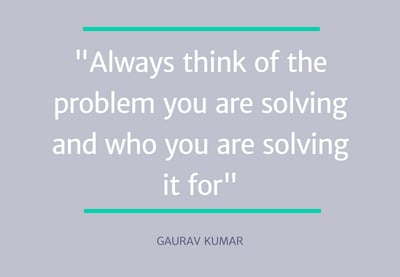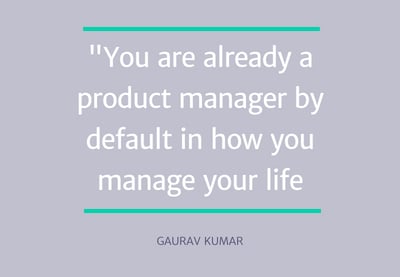Updated: January 24, 2024- 9 min read
“I have a keen interest in solving complex problems in healthcare using design and data. My experience spans multiple domains, including patient engagement, pharmacy benefits and operations, data acquisition and FHIR applications. Beyond thinking about products; I am curious about cosmology, neuroscience, music and art”.– Gaurav Kumar
This week, #AskMeAnything welcomed Gaurav Kumar, Senior Product Manager at NimbleRx! Read on to hear his responses to community questions about his Product Management experiences. Want your questions answered? Then join us next time!

Could you tell us a little about your journey to becoming a PM?
I was doing my Master’s in electrical engineering and I happened to audit a couple of business school courses. I met a group of people there and we were working on a few cases and projects that I was providing some technical background on. Turned out, I was doing a PM role without even knowing it! There was no looking back from there – I loved working cross-functionally and getting a group of people to commit to ideas and a path forward and that’s how I got into product.
What would you recommend to a Project Manager looking to make the switch to Product Management?
I would recommend a combination of both! There’s nothing quite like jumping into an associate PM or junior PM role and picking things up from there. Also, doing a course will help you get fluent with some of the ‘working language’ you will need, especially in software product management. Regardless of how you approach it – always think of the problem you are solving and who you are solving it for.
What were some of the most useful courses you took in business school that helped you?
One course that I audited was called ‘Fundamentals of Business Strategy and Finance’ – it was the perfect business 101 contexts I needed to understand how to think of businesses as a a whole. Another course was in Entrepreneurship, which was also very helpful.
At NimbleRx, how did you prototype and what did beta look like?
NimbleRx was very interesting in that a lot of our prototypes had to go straight into production! The reason being, in pharmacy systems, you can’t really test anything pre-production since the back-end processing platforms they use are pretty antiquated and only provide data in production environments. However, what we did was ‘prototype’ every single possible use case and edge case and tie analytics to them so that when we went live, we were prepared for the worst. Thankfully, the worst never happened! For the first 6 months – it was rolling up sleeves and diving deep into understanding all the system integrations and data points that were critical to keep pharmacy operations live.

What are the perks of being a PM? What are some of the best experiences or growth opportunities you have had being a PM?
I think the biggest perk of being a PM is seeing a feature or product go live and you hear some good feedback about how it helped someone accomplish a task or solve a problem for them! There’s nothing more rewarding than that. The best growth opportunities have been in customer-facing roles – working in a B2B world is the best way to grow one’s perspective of the market and how CXOs are thinking about your product.
How did you break into Product Management? What were some of the hard skills required?
Try to get into a junior or associate PM role. For hard skills, I would read some of these resources; stratechery.com, Business Model Generation, The Design of Everyday Things are a good start. There are no exact ‘hard skills’ in product. It depends on the role; some PM roles are heavier on the technical side, so if you have some coding experience, it would work well. Other roles are heavier on the strategy or growth side so an MBA would come in use here.
Can you provide some detail around tying in analytics to use cases and edge cases?
I would try to break down every use case into the following structure:Each use case has inputs and outputs in its simplest form. Try to list all of them out and then determine which are ‘critical paths’ i.e. your business or user outcome will fail if you get something invalid. Leave the rest of them out to avoid noise in your analytics. Once you have that, using your favorite analytics tool – track how frequently you are getting inputs and outputs that meet your pass or fail criteria. Run a test sample of entering those use cases and edge cases and then look at your spread across the inputs, outputs and pass or fail criteria. And then you can get a sense of what use cases you really need to care about in detail and which ones can be addressed later.

How do you identify features for an MVP product in the healthcare industry? How do you come up with your roll out strategy?
I think the best approach to getting to an MVP in healthcare is first to think of it as an MP i.e. Minimum Product. Viability should be the next step in how you build a $$ generating business. The reason being, the ‘start-up’ infrastructure, costs, skills needed and regulations to check the box on are your ‘Minimum Product’ – it’s the table stakes to operate in the area that you choose. So identifying them would be to understand all those elements that you need to put together to get to a minimum product and from there think of your value proposition that will drive revenue in the business model. For roll-out strategies – always go with the voice of the customer. Talk to as many users, stakeholders, customers etc. that you can find and tie in those learnings into your release plan. Some things that are obvious to some users are not to to others, especially in the healthcare context.
Can you name several Product Management practices that worked really well and some that didn’t?
Practices that work well: 1. Listen first, comprehend later.2. Always bring or ask for data.3. Be concise but complete in everything you articulate.4. Break every problem down to the simplest form.
Practices that don’t work so well:1. Working in a silo/void2. Basing everything on a hunch. Intuition is great for a PM, but only goes so far.3. Over-complicating a solution.
What do you recommend to a PM with no tech background?
I would recommend reading some tech stuff! You don’t need to know how to code, but if you can get basic concepts, that’s all that matters. Essentially the crux of Product Management is articulating the What and the Why – what’s the problem you are solving and why it is important. The How – thats for engineering and design to come up with, with the PM as a consultant. Read the Algorithm Design Manual by S. Skiena – its a pretty technical book, but it describes some concepts that you can skim over that will help. Also look at W3 Schools to understand the basics of a tech stack – e.g.: how a typical website/service is built.
Can you name analytics tools you used in the past, which you prefer and why?
Having worked with several, I think they all have some ups and downs. I would say Periscope and Amplitude are great for PMs – just specify your ‘hooks’ in your UI experience that you want to track and engineering can code it right in and you will very easily be able to see how your product/feature is performing. For larger analytics solutions, Tableau and Looker are great for visualizations, especially since they are HIPAA certified for healthcare applications.

Can you give us some advice on how to go from entertainment industry consulting roles to a full-time job in product?
I would say just jump right in! Either look for Associate or Junior PM roles or look for something in user research. With your background, you probably already have insights on the needs and problems of users in the entertainment industry. So look for something where you can apply all that user context to solve problems. A PM role does not always have to start with a PM title, if you can land something that’s hands on in terms of implementation/onsite experience, then that will bolster your chances of pivoting to a PM role.
Is the Product School program helpful for making a shift into PM or is it more of a boot camp to get sharper?
Since there really is no ‘Product Management’ degree as such, the Product School courses will provide you with some of the context and working language that are key to success in a typical PM role in tech. So I would say it is really a key element in being able to make a career shift.
Where do you see Product Management in the healthcare sector going in the next 5 years or so?
I think as with most other industries, the PM role is evolving constantly. For healthcare, I think it will eventually become something where medical context will be a key aspect to success as a PM – so having some level of hands on/in-field experience will become a must. Several companies are already requiring 2-3 years of clinical or health admin experience as a requirement for PMs.
Any final Advice?
Don’t forget that you are already a product manager by default in how you manage your life! Keep reading, keep listening and ask questions like a 5-year-old – it’s what most PMs do 😉
Updated: January 24, 2024




